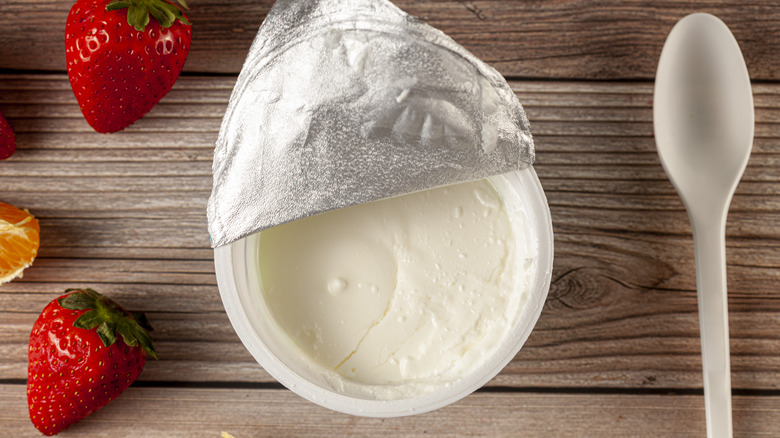Use Store-Bought Yogurt To Easily Fix Your Failed Homemade Version
Though it may not necessarily seem worthwhile given just how much variety there is at the store, making homemade yogurt is always worth the effort. Even if it fails. Every cook goes through a period of trial and error where they are trying to figure out how to do certain things. Fermenting yogurt is no exception. The good, and slightly ironic, news is that if you have a failed batch of yogurt, there is an easy way to save it with store-bought yogurt.
Yogurt is, quite simply, the combination of milk and two live, active cultures: streptococcus thermophilus and the bulgaricus subspecies of lactobacillus delbrueckii. These two cultures work off of one another to break apart and reform the milk proteins into the thick, globular, sour-tasting yogurt we know and love.
When you're making yogurt from scratch, you may notice that it has not set or fermented the way it should have. This could be for any number of reasons, but the most likely culprit is that the cultures were not fermented enough to cause the thickening of the yogurt. This is where the store-bought yogurt can come into play. A plain cup of yogurt, one that specifically reads as having live, active cultures, can be added to the failed yogurt as a way of reviving the cultures and making for a wonderfully thick and sour yogurt.
Heat and cultures and thickness, oh my!
The reason store-bought yogurt can work so well as a reviver of failed homemade yogurt is because it can double as a starter culture. Just like sourdough bread has a preferment that helps the bulk dough along in its fermentation, so too can store-bought cultured yogurt help kick off the fermentation in the yogurt-making process. The already active cultures in the successful yogurt will feed and grow alongside the ones in the failed yogurt, leading to a revival of the cultures and a thickening of the yogurt.
You do, however, need to make sure that your yogurt is fermenting at the right heat. Between 105 and 112 degrees Fahrenheit are the optimal temperatures at which yogurt ferments best. This is because those active cultures are awfully finicky and prefer their temperature just so, otherwise, they won't procreate properly. The heat also allows any other potentially harmful or fermentation-blocking bacteria to be killed off. It's the cultures you want working with each other to multiply, not be hindered by additional bacteria.
All told, homemade yogurt is a worthwhile effort, even if you have to use store-bought to revive a failed batch or start a new batch. Just make sure you use plain yogurt from a brand you like because its flavor is going to impart onto your homemade batch.

